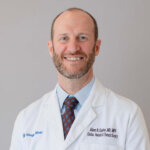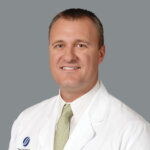Cardiovascular & Thoracic Surgery
Learn more about some of the procedures our cardiologists and cardiothoracic surgeons perform for our patients at Singing River Health System.
Coronary Artery Bypass Surgery
Coronary Artery Bypass Surgery is the most common procedure performed by the cardiothoracic surgeons at Singing River Health System.
If you have a blocked artery to your heart, your doctor may want you to have coronary artery bypass surgery. During this open heart surgery, your surgeon will take a section of healthy blood vessel from inside your chest wall or from your leg. They will then attach the ends above and below the blocked artery or arteries so that blood flow is redirected around the diseased artery.
While some patients can manage their heart disease with medications and less invasive procedures such as stents and angioplasty, there are patients that do better with bypass. Those patients are offered bypass because they are more likely to live longer without heart attacks or the need for angioplasty.
Carotid Endarterectomy (Plaque Removal)
The Carotid Artery brings blood to your brain and face, and the vein exists on either side of your neck. Over time, plaque may build up in this artery. If the blood supply to your brain is slowed or interrupted due to plaque, there is a significant chance of stroke.
During this procedure, the cardiovascular surgeon removes this plaque, restoring proper blood flow to the brain.
Valve Repair and Replacement
Structural Heart Program
Singing River Health System, with our network of interventional cardiologists and cardiothoracic surgeons, are pioneering a Structural Heart Program. Our group is working to ensure that patients are receiving the latest technology in minimally invasive procedures on the structures of the heart.
Transcatheter Mitral Valve Repair: MitraClip & PASCAL
We are the first provider in South Mississippi to offer MitraClip and PASCAL. Alternatives to open heart surgery, MitraClip and PASCAL are minimally invasive mitral valve repair procedures for patients with mitral regurgitation.
Transcatheter Aortic Valve Replacement (TAVR)
TAVR is a breakthrough treatment for severe aortic stenosis. It is now considered the standard of care for aortic valve replacement in patients who are too high risk for open heart surgery.
WATCHMAN Atrial Fibrillation Implant
WATCHMAN reduces stroke risk in people with atrial fibrillation not caused by a heart valve problem. It works differently from blood thinners like warfarin. WATCHMAN is a permanent implant that closes off a part of the heart where blood clots commonly form.
Aneurysm Repair
An aneurysm is the abnormal ballooning of a blood vessel. The most clinically significant are the arteries. The most common area we see it is the abdominal aorta. As these dilate over time, it’s like a balloon — it can only get so big. The area with weakness may develop a leak, and when those occur it can life threatening.
There are two methods of repairing a thoracic aortic aneurysm:
- Endovascular repair: less invasive, a series of stents are installed within the aorta via catheter.
- For those that aren’t candidates for endovascular repair, an open procedure is recommended. This procedure is a good operation with great, long-term results but is more invasive and requires more recovery time.
Thoracic Robotic-Assisted Procedures
- Lobectomy and Wedge Resections
- Lung Biopsy




